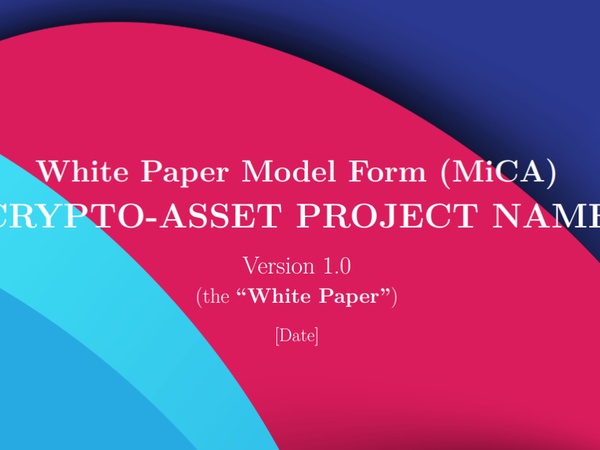Authorisation
MiCA provides that no person shall offer crypto-asset services, within the EU, unless that person is (a) a legal person or other undertaking authorised as a CASP; or (b) a financial entity that is allowed to provide crypto-asset services.
12 min read
7 May 2024
Introduction
In accordance with Article 59 of the EU Regulation on Markets in Crypto-Assets (MiCA), no person shall provide crypto-asset services, within the EU, unless that person is:
(a) a legal person or other undertaking that has been authorised as crypto-asset service provider (CASP); or
(b) a credit institution, central securities depository, investment firm, market operator, electronic money institution, UCITS management company, or an alternative investment fund manager that is allowed to provide crypto-asset services.
A) Authorisation as a CASP
No person can provide crypto-asset services, within the EU, unless that person is a legal person or other undertaking authorised as a crypto-asset service provider. The entities that may be authorised as a CASP were discussed in this Website, in the different subtitles of "What is a Crypto-asset service provider (CASP)?". In order for a legal person or other undertaking to obtain and meet at all times the conditions of its CASP authorisation (Article 59-4 MiCA), it must (non-exhaustive list):
| Have a registered office in a Member State where it carries out at least part of its crypto-asset services | Article 59-2 MiCA |
| Have the place of effective management in the EU | Article 59-2 MiCA |
| Have at least one of the directors as resident in the EU | Article 59-2 MiCA |
| Submit its application for an authorisation as a CASP to the competent authority of its home EU Member State (e.g., in Luxembourg it is the Commission de Surveillance du Secteur Financier) | Article 62-1 MiCA |
| Include all required information with the application, including the name, legal form, website, contact details, articles of association, programme of operations, types of crypto-asset services to provide, identity of shareholders and members with (direct or indirect) qualifying holdings, technical documentation of the ICT systems, the type of crypto-assets to which the crypto-asset service relates | Article 62-2(a)(b)(c)(d)(h)(j) and (s) MiCA |
| Describe, implement, and maintain governance arrangements, internal control mechanisms to identify/assess/manage risks and a business continuity plan (including AML risks, conflicts of interest and operational risks in relation to outsourced services or activities to third parties), the procedure for segregation of clients’ crypto-assets and funds, and the complaints-handling procedures | Article 62-2(f)(i)(k) & (l) MiCA - Article 68 MiCA - Article 70 MiCA - Article 71 MiCA - Article 72 MiCA - Article 73 MiCA |
| Prove that it meets the requirements for prudential safeguards set by MICA - including but not limited to a certain amount of permanent minimum capital depending on provided classes/categories of crypto-asset services: Class 1: 50.000 € ; Class 2: 125.000 € ; Class 3: 150.000 €. Please go here in our Webpage to understand which CASP belong to which Class or contact us after having read our Terms and Conditions beforehand. | Article 62-2(e) MiCA - Article 67 MiCA |
| Prove that (a) members of its management body do not have a criminal record or penalties related to commercial law, insolvency law, financial services law, anti-money laundering, counter-terrorist financing, fraud, or professional liability; and that (b) the management collectively possesses the required knowledge, skills, and experience to manage the service provider, with an expectation that they will commit adequate time to their roles | Article 62-2(g) MiCA - Article 62-3(a)(b) MiCA |
| Prove that all shareholders and members with qualifying holdings do not have a criminal record or penalties in the same legal areas | Article 62-2(h) MiCA - Article 62-3(c) MiCA |
| Act honestly, fairly and professionally in the best interests of clients |
Please note that this is a non-exhaustive list of obligations. It is important to acknowledge that additional obligations, including those to specific crypto-asset services, may also be applicable.
Please feel free to contact us for further discussion regarding these and other CASP obligations, or for assistance in requesting a CASP authorisation, but please ensure that you have read our Terms and Conditions beforehand.
B) Notification of financial entities to provide crypto-asset services
No person can provide crypto-asset services, within the EU, unless that person is a regulated financial entity that is allowed to provide crypto-asset services - in particular:
(i) a credit institution authorised under Directive 2013/36/EU (Article 59-1(b) MiCA; Article 3-1(28) MiCA);
(ii) a central securities depository authorised under Regulation 909/2014/EU (Article 59-1(b) MiCA);
(iii) an investment firm authorised under Directive 2014/65/EU (Article 59-1(b) MiCA; Article 3-1(29) MiCA);
(iv) a market operator authorised under Directive 2014/65/EU (Article 59-1(b) MiCA);
(v) an electronic money institution authorised under Directive 2009/110/EC (Article 59-1(b) MiCA; Article 3-1(43) MiCA);
(vi) a UCITS management company authorised under Directive 2009/65/EC or Directive 2011/61/EU (Article 59-1(b) MiCA; Article 3-1(47) of MiCA); or
(vii) an alternative investment fund manager (Article 59-1(b) MiCA; Article 3-1(48) MiCA).
To be allowed to provide crypto-asset services, the financial entity must notify to the competent authority of its home EU Member State a programme of operations setting out the types of crypto-asset services it intends to provide (Article 60-7(a) MiCA). However, with the “notification regime”, the financial entity is only allowed to provide crypto-asset services that are deemed equivalent to those for which it was already authorised (and not all crypto-asset services listed by Article 3-1(16) MiCA):
| Notification | |
|---|---|
| Original services | Equivalent crypto-asset services |
| ☖ Credit institution | |
| All investment services and all investment activities listed in Annex I, Section A, Directive 2014/65/EU (" MiFID II "), as well as in Annex II, Section A, of the amended Luxembourg Law of 5 April 1993 on the financial sector (“ LFS ”) ( Articles 8 & 8a CRD ; Article 4-1(1) CRR ; Annex I, Section A, MiFID II ; Annex II, Section A, LFS ) All ancillary services listed in Annex I, Section B, MiFID II, as well as in Annex II, Section C, LFS ( Articles 8 & 8a CRD ; Article 4-1(1) CRR ; Annex I, Section B, MiFID II ; Annex II, Section C, LFS ) |
May provide (all) crypto-asset services ( Article 60-1 MiCA ) For example: credit institutions may provide custody and administration of crypto-assets on behalf of clients ( Article 10-3(a) MiCA ) |
| ☖ Central securities depository | |
| Providing, maintaining, or operating securities accounts in relation to the settlement service ( Article 16-2 Regulation (EU) No 909/2014 ; Annex, Section B, point 3, Regulation (EU) No 909/2014 ) | Providing custody and administration of crypto-assets on behalf of clients (It may only provide this service - Article 60-2 MiCA ) |
| ☖ Investment firm | |
| Ancillary service of Safekeeping and administration of financial instruments for the account of clients, including custodianship and related services such as cash/collateral management and excluding providing and maintaining securities accounts at the top tier level (‘central maintenance service’) ( Article 6-1 MiFID II ; Annex I, Section B, point (1), MiFID II ) | Providing custody and administration of crypto-assets on behalf of clients ( Article 60-3(a) MiCA ) |
| Operation of an MTF ( Article 6-1 MiFID II ; Article 4(2) MiFID II ; Annex I, Section A, point (8), MiFID II ) Operation of an OTF ( Article 6-1 MiFID II ; Article 4(2) MiFID II ; Annex I, Section A, point (9), MiFID II ) |
Operation of a trading platform for crypto-assets ( Article 60-3(b) MiCA ) |
| Dealing on own account ( Article 6-1 MiFID II ; Article 4(2) MiFID II ; Annex I, Section A, point (3), MiFID II ) | Exchange of crypto-assets for funds or for other crypto-assets ( Article 60-3(c) MiCA ) |
| Execution of orders on behalf of clients ( Article 6-1 MiFID II ; Article 4(2) MiFID II ; Annex I, Section A, point (2), MiFID II ) | Execution of orders for crypto-assets on behalf of clients ( Article 60-3(d) MiCA ) |
| Underwriting of financial instruments and/or placing of financial instruments on a firm commitment basis ( Article 6-1 MiFID II ; Article 4(2) MiFID II ; Annex I, Section A, point (6), MiFID II ) Placing of financial instruments without a firm commitment basis ( Article 6-1 MiFID II ; Article 4(2) MiFID II ; Annex I, Section A, point (7), MiFID II ) |
Placing of crypto-assets ( Article 60-3(e) MiCA ) |
| Reception and transmission of orders in relation to one or more financial instruments ( Article 6-1 MiFID II ; Article 4(2) MiFID II ; Annex I, Section A, point (1), MiFID II ) | Reception and transmission of orders for crypto-assets on behalf of clients ( Article 60-3(f) MiCA ) |
| Investment advice ( Article 6-1 MiFID II ; Article 4(2) MiFID II ; Annex I, Section A, point (5), MiFID II ) | Providing advice on crypto-assets ( Article 60-3(g) MiCA ) |
| Portfolio management ( Article 6-1 MiFID II ; Article 4(2) MiFID II ; Annex I, Section A, point (4), MiFID II ) | Providing portfolio management on crypto-assets ( Article 60-3(h) MiCA ) |
| ☖ Electronic money institution | |
| With regard to the electronic money tokens it issues ( Article 6-1 Directive 2009/110/EC ) | Providing custody and administration of crypto-assets on behalf of clients ( Article 60-4 MiCA ) Providing transfer services for crypto-assets on behalf of clients ( Article 60-4 MiCA ) |
| ☖ UCITS management company or Alternative fund investment manager | |
| Non-core service of reception and transmission of orders in relation to financial instruments ( Article 6-4(b)(iii) Directive 2011/61/EU ) | Reception and transmission of orders for crypto-assets on behalf of clients ( Article 60-5(a) MiCA ) |
| Non-core service of investment advice ( Article 6-4(b)(i) Directive 2011/61/EU ; Article 6-3(b)(i) Directive 2009/65/EC ) | Providing advice on crypto-assets ( Article 60-5(b) MiCA ) |
| Management of portfolios of investments, including those owned by pension funds and institutions for occupational retirement provision ( Article 6-4(a) Directive 2011/61/EU ; Article 6-3(a) Directive 2009/65/EC ) | Providing portfolio management on crypto-assets ( Article 60-5(c) MiCA ) |
| ☖ Market operator | |
| Operation of a regulated market (an MTF or an OTF) ( Article 4-1(18) MiFID II ; Article 5-2 MiFID II ) | Operation of a trading platform for crypto-assets ( Article 60-6 MiCA ) |
In its notification, the financial entity must also provide a certain amount of other information to the competent authority of its home Member State, at least 40 working days before providing those services for the first time.
Please feel free to contact us for further discussion regarding these obligations, or for assistance in performing a services’ notification, but please ensure that you have read our Terms and Conditions beforehand.
Two specific situations should finally be addressed:
- The provision of crypto-asset services at the exclusive initiative of the client (Article 61 MiCA); and
- The cross-border provision of crypto-asset services (Article 65 MiCA).
C) Provision of crypto-asset services at the exclusive initiative of the client (Reverse solicitation)
If the provision of a crypto-asset service/activity is (a) initiated by a client in the EU, (b) offered by a third-country firm, and (c) made so at the client’s own exclusive initiative, then the requirement for a CASP authorisation exceptionally does not apply to that third-country firm with regards to the provision of that service/activity. This includes the relationship between that client and the third-country firm relating specifically to the provision of that service/activity (Article 61-1 MiCA). In order for this exception to be applicable, the 3 conditions seen above must be met - in particular, the exception is only applicable to third-country firms (firms with no registered office in an EU Member State). Furthermore, the third-country firm is not entitled to market new types of crypto-assets or crypto-asset services to that client other than those specifically requested at the client’s own initiative (Article 61-2 MiCA).
This exception was taken from provisions applicable to investment services: where a client in the EU initiates at its own exclusive initiative the provision of an investment service/activity by a third-country firm, the requirement for authorisation to the provision of that service/activity by the third country firm does not apply (Article 42 MiFID II; Article 32-1(3) LFS). The LFS calls this “reverse solicitation” (Article 32-1(3) LFS; CSSF, Circular CSSF 19/716, p. 12).
By analogy with investment services, the third-country firm in a reverse solicitation may theoretically be able to provide a crypto-asset service/activity in Luxembourg without having to establish a branch, or even without having to obtain any decision of the CSSF, and this is irrespective of the client’s classification (retail client, per se professional client, professional client on request or eligible counterparty) (CSSF, Circular CSSF 19/716, p. 12). The situation of "reverse solicitation" must be assessed by the third-country firm for every service and on a continuous basis (CSSF, Circular CSSF 19/716, p. 12).
On the contrary, if a third-country firm solicits clients or prospective clients in the EU, it is not deemed to be a service provided on the client’s own exclusive initiative. This applies regardless of the means of communication used for the solicitation, promotion or advertising in the EU, or any contractual clause or disclaimer stating activity (Article 61-1 MiCA). In this case, the third-country firm must be authorised as crypto-asset service provider (CASP) (Article 59-1(a) MiCA), and meet at all times the conditions to maintain its CASP authorisation (Article 59-4 MiCA).
The European Securities and Markets Authority (ESMA) will issue guidelines to specify the situations in which a third-country firm is deemed to solicit clients in the EU and to foster convergence and promote consistent supervision in respect of the risk of abuse (Article 61-3 MiCA).
D) Cross-border provision of crypto-asset services
CASPs intending to offer services in more than one Member State must submit specific information to the competent authority of the home EU Member State. This information includes (i) a list of Member States where the provider intends to offer services, (ii) the crypto-asset services to be provided, (iii) the starting date of service provision, and (iv) a list of all other activities not covered by the regulation. (Article 65-1 MiCA).
The competent authority of the home Member State will communicate this information within 10 working days to (i) the other EU Member State authorities, (ii) ESMA, and (iii) EBA. ESMA will register that information in its CASP register (Article 65-2 MiCA).
This registration will be communicated to the CASP in question (Article 65-3 MiCA), who may start to provide crypto-asset services in other Member States from the date of the receipt of that communication or at the latest from the 15th calendar day after submitting the required information (Article 65-4 MiCA).



